The Worshipful Company of Plumbers 40th Annual Lecture 12 May 2025
TALES FROM THE RIVERBANK was the compelling theme for the 40th Annual Lecture of The Worshipful Company of Plumbers, hosted at Wax Chandlers’ Hall on 12 May 2025. Guests were treated to an evening of insight and challenge as Dr Peter Matthews CBE and Mark Lloyd, both leading voices in environmental and water policy, explored the hard truths behind the state of Britain’s rivers, public trust in the water industry, and the urgent call for collective action.
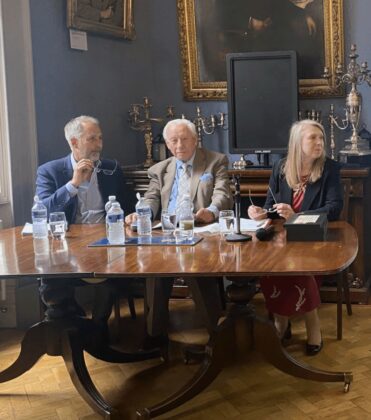
TALES FROM THE RIVERBANK By Dr Peter Matthews and Mark Lloyd
The Master Introduced the proceedings by welcoming other Worshipful Masters and our Apprentice Plumbers. The Master also thanked the Company’s sponsors: Catchpole and Rye, and The Plumbers Charity for their support for this evening’s lecture.
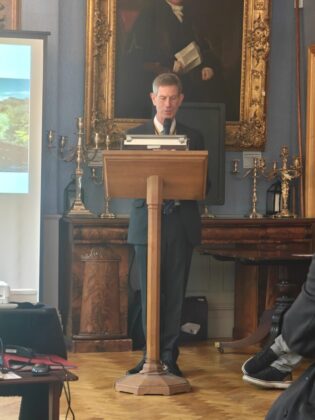
The Master opened the evening by noting that press coverage is increasingly dominated by the alarming state of our rivers, with public trust in water companies at an all-time low. Many are quick to blame the industry for turning waterways into sewers—but, he asked, are they the only ones responsible? He expressed hope that this evening’s lecture would help shed light on that important question.
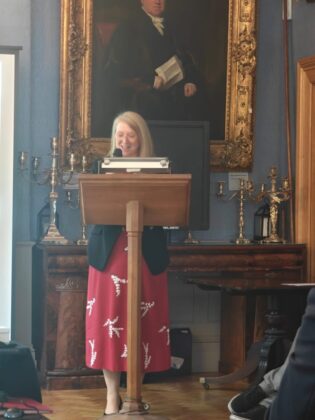
Julie Spinks introduced this evening’s speakers:
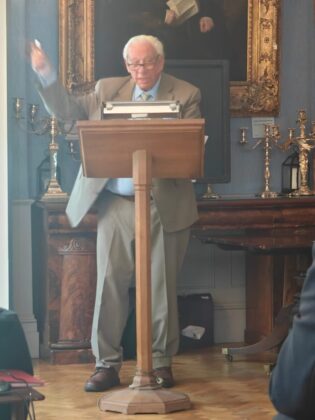
Dr Peter Matthews CBE has dedicated over 60 years to the field of water management, with a distinguished career spanning from frontline technical operations in the water industry to the highest levels of national environmental policy.
Originally trained as a chemist in the pharmaceutical sector, Dr Matthews transitioned into water services, rising through the Scientific Branch of the Greater London Council and Anglian Water, eventually becoming Deputy Managing Director of Anglian Water International. He held multiple senior roles across the Anglian Water Group, serving on the boards of several of its subsidiary companies.
Dr Matthews has also held a number of influential public appointments, including board memberships at the Environment Agency and the Port of London, and serving as Chair of the Northern Ireland Authority for Utility Regulation. He retired in 2016 as the Founding Chair of Natural Resources Wales.
He remains actively involved in shaping national policy through his voluntary work with the Worshipful Company of Water Conservators, where he leads on initiatives to promote best practice in water conservation.
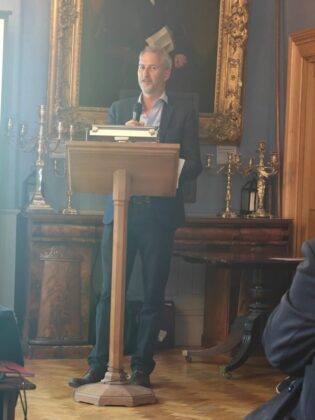
Mark Lloyd read Geography at St Catherine’s College, Oxford, before completing a Master’s degree in Environmental Water Management at Cranfield University. In 1994, he founded Thames21, a pioneering charity focused on cleaning up London’s rivers, which he led for eleven years.
He went on to serve as Chief Executive of several angling and environmental conservation organisations, building a distinguished reputation in the sector. In 2019, Mark was appointed Chief Executive of The Rivers Trust, the umbrella organisation for 67 independent rivers trusts across the UK and Ireland. Together, they employ over 600 staff and work in partnership to restore wild, healthy, and natural rivers—valued by communities and ecosystems alike.
The Lecture – Tales from the Riverbank
Dr Peter Matthews CBE opened the lecture by promising a straightforward overview of how we arrived at the current state of affairs from a utilities and regulatory perspective.
Is there a crisis? Peter suggested not. The current water and sewage system was established 35 years ago with the privatisation of the water industry. While he acknowledged the system requires improvement, he felt that disproportionate attention has been given to the sector, fuelled by media and political uproar.
Looking back, Peter explained that prior to 1974, numerous organisations—mostly local authorities—provided water and sewage services. By the 1980s, under the Thatcher/Lawson era, public spending was curtailed, and the Treasury restricted investment by state-run bodies.
It became clear by the mid-1980s that substantial investment in the water industry was needed. The solution was to convert Water Boards into equity-based companies capable of privatisation. The original vision was that UK citizens would own these companies through a straightforward PLC model—without complex financial engineering.
New legislation empowered the Environment Agency to inspect water standards, while water companies were licensed, required to submit five-year business plans, and subjected to five-year pricing reviews by the independent regulator OFWAT. Natural England also emerged as the environmental regulator.
Virtually overnight, the system shifted from non-profit government ownership to publicly traded companies with shareholder expectations. Over time, this model enabled ownership by external investors.
Today, Peter noted, all companies are struggling—regardless of ownership structure. Many have turned to financial engineering to maximise shareholder returns. While £236 billion has been invested since 1989 (up from £2.2 billion at privatisation), £70–80 billion has also been paid out in dividends, and water companies now carry a combined debt of £60 billion. OFWAT, meanwhile, has prioritised keeping household bills steady.
Peter argued that it’s unfair to place the blame solely on OFWAT, as the Treasury still pulls the financial levers.
He also highlighted a host of additional pressures since 1989: EU legislation, the 2007–08 financial crisis, Brexit, and now conflict in Europe.
The Government’s plan to build 1.5 million homes this Parliament adds further demand on water infrastructure. Meanwhile, companies have now completed the installation of discharge monitors, creating a transparency that has triggered tension with vocal groups such as wild swimmers.
The situation is complicated by multiple Government departments having overlapping water policies with little coordination. Adding to this are the AI data centres, which require large volumes of water to operate.
Peter acknowledged that water companies have not helped themselves—the use of financial engineering, inflated executive pay, and bonuses are now at the heart of legal discussions around the proposed KKR rescue of Thames Water.
He also challenged the blame culture. Water is regularly tested for 53 contaminants—if just one is present, the sample fails. Removing just three of the most persistent (including lead from old dental work) would result in 93% of samples passing.
Agricultural run-off, however, remains a major contributor to river pollution. To eliminate sewage overflows completely would require a full infrastructure rebuild—estimated at £360 billion.
Peter concluded by expressing hope that the upcoming independent Government review led by Sir Jon Cunliffe (due in July 2025) will restore the original, straightforward principles of privatisation, end harmful financial practices, and enable better catchment management.
He also advocated for England to follow Wales in merging the Environment Agency with Natural England to simplify regulation and oversight.
Dr Peter Matthews CBE – Presentation to the Worshipful Company of Plumbers 40th Annual Lecture Wax Chandlers’ Hall – 12 May 2025 TALES FROM THE RIVERBANK
Mark Lloyd, Chief Executive of The Rivers Trust, followed with a passionate and data-driven presentation on the current state of the UK’s rivers, drawing from 30 years of hands-on experience.
He presented pollution breakdowns from multiple sources:
-
Agriculture: 62%
-
Water company discharges: 54%
-
Roads and transport: 26%
The figures exceed 100% because many river pollutants come from multiple overlapping sources.
Mark emphasised that agriculture is the primary issue—ranging from chemical fertilisers and pharmaceutical residues from livestock, to the widespread use of animal muck as fertiliser, which often ends up in rivers. He cited the Wye catchment, with its concentration of chicken farms, as a clear example.
Low river flows, followed by heavy rainfall, worsen pollution by flushing concentrated contaminants into waterways. Climate change compounds this with warmer winters and more erratic rainfall patterns. The pressure of 1.5 million new homes, many with hard paving, exacerbates the problem by increasing surface runoff.
Key to the solution, Mark argued, is soil management. Healthy soils recharge aquifers, retain carbon, and reduce runoff. The answer lies in natural and catchment-based solutions—capturing rainfall at the source, rather than building massive CO₂-intensive downstream infrastructure.
He called for greater focus on rewetting peatland, sustainable urban drainage, and ecosystem-based approaches. While large tanks can temporarily mitigate flooding and overflows, they are costly and energy-heavy.
Mark highlighted the importance of collaboration. 65 local river trusts are already working together across regions to develop multi-source, multi-funder initiatives. One such project in the River Wyre catchment has helped a flood-prone community implement ecosystem-based interventions backed by impact investors.
He expressed frustration with regulatory delays, noting that it can take two years to alter a weir. He also criticised the quality of Environment Agency data, stressing the need for accurate measurement to enable effective management.
Mark Lloyd – Presentation to the Worshipful Company of Plumbers 40th Annual Lecture Wax Chandlers’ Hall – 12 May 2025 WCoP Rivers Trust Presentation May 2025
Unregulated dairy farms, Mark argued, pose as much risk to river health as sewage treatment works—yet receive far less scrutiny.
To address these issues, The Rivers Trust is consolidating catchment partnerships into ten regional teams. However, regulatory barriers must be eased to allow meaningful environmental action.
Questions from the Hall
What one thing would you do now, if you could?
-
Peter: Integrate funding at a regional level. Create a single water strategy across Government departments and stop financial engineering.
-
Mark: Stop developers stripping land and enforce soakaway requirements during construction. Cited the stalled Oxford–Cambridge sewage works relocation—still unresolved after 30 years—as an example of regulatory inertia.
On the impact of fly fishing:
-
Peter: Fishermen vastly outnumber wild swimmers, who have hijacked the narrative. Wild swimming is inherently risky. Billions could be spent on overflows, yet swimmers may still find water deemed unsafe.
Do we need a combined water and land strategy?
-
Mark: Absolutely. As in Wales, water and land use should be integrated.
A contribution from The Master Farmer stressed the need to support profitable farming. He noted that subsidy changes are prompting some farmers to adopt river-friendly practices—but ultimately, food prices may need to rise to support environmental improvements.
-
Mark: Public funding for agriculture will likely reduce, and merging Natural England and the Environment Agency may amount to little more than “moving the deckchairs.”
-
Peter: Executive pay and bonuses at water companies remain a lightning rod for public criticism.
-
Mark: We must improve how we value our rivers, rally around shared solutions, and empower Government to act boldly—something The Rivers Trust is advocating through its submission to the Cunliffe Commission.
-
Peter: Historically, rivers had a defined community use. We must return to that principle and ensure people are once again involved in the life and stewardship of their rivers.
Author: Mike Patton Steward